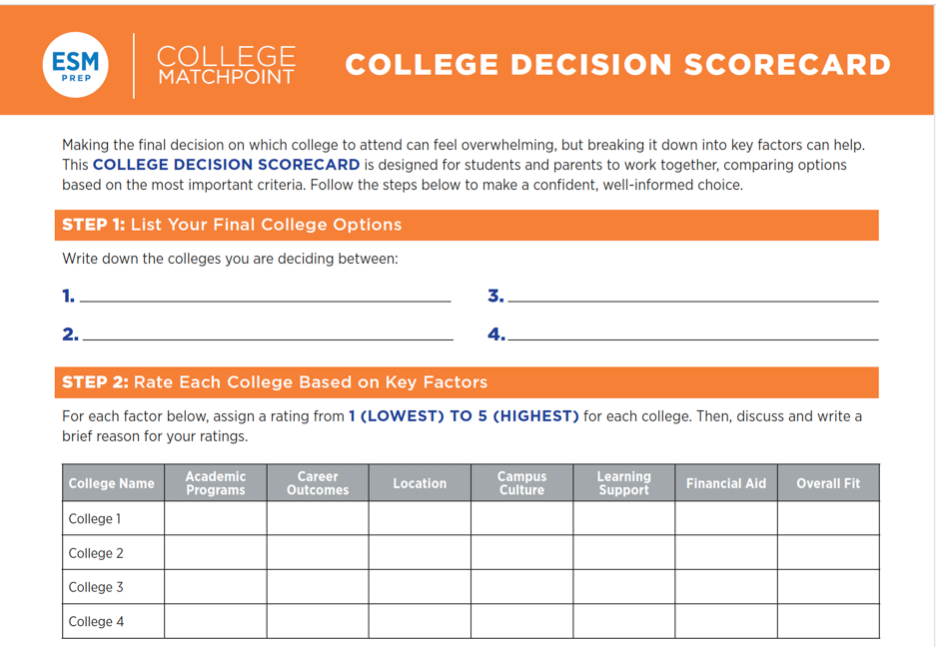This page is licensed under Creative Commons under Attribution 4.0 International. Anyone can share content from this page, with attribution and link to College MatchPoint requested.
For Rising Juniors, August Is The Time to Plan, Not Panic
For rising juniors, it’s both exciting and scary to realize that college applications are less than a year away. August of junior year is a turning point for many families, because it marks the beginning of a school year, when college planning activities begin to come into focus.

While there is no one way to approach the tasks needed to prepare for college, we believe there are certain tasks that, when completed, will put your student on a path for success. We certainly don't want to add to any existing stress, but we know that having a plan in place can have a big impact on rising juniors as they start the new school year. Planning and preparation are essential components to accomplishing you and your child’s goals.
Here are the 5 priorities we suggest students focus on this fall:
Focus on academics as your #1 priority
Colleges look closely at your junior year academic performance, so academics should be your top focus. The grades you make during your junior year are very important, because these are the last grades college will evaluate on your transcript with your college application. Your junior year grades are your last chance to either show off your good grades or prove upward trending grades. Having a strict game plan will help you stay focused, so come up with a strategy for approaching each semester—and stick to it. A little forethought and a lot of hard work can help you register an impressive academic performance this year.
Finalize your standardized testing plan
Creating a testing plan can be overwhelming, particularly given colleges’ ever-changing standardized testing requirements. If you add in having to navigate the accommodations process, it can be hard to even know where to start. Whether you’re applying to a public university close to home or a highly selective college, there’s a good chance your application will include test scores from either the SAT or the ACT. Colleges and universities use test scores in various ways, but most often, they are used as indicators of academic ability and potential. They may also be used to determine scholarship eligibility. We hope these
five suggestions will help guide you as you develop your testing plan.

Confirm your likely college major
Choosing a major is tough. Not only are colleges asking a 16- or 17-year-old to decide what they want to study for the next four years, but the decision also has the potential to impact the rest of the student's life. It’s fair to assume that most teenagers are not sure what they want to study in college. Some may be debating between majors in similar fields of study; others may be entirely unsure. Students wonder if their intended major will alter their college acceptance odds. At some schools (typically large, public universities), certain majors are impacted, meaning the number of students pursuing a degree in that major exceeds the resources available to the major’s department. For example, at UT Austin, the choice of a major is crucial, as it becomes the lens through which an admissions reviewer evaluates each item in an application: transcript, test scores (if submitted), essays, short answers, resume, and letters of recommendation. We encourage students to utilize our
Guide To Exploring College Majors.
Take the initiative in extracurricular activities
We've found that students benefit from taking a step back and assessing their aptitudes, skills, and motivations. By asking, "What do I naturally do well?", "What are the skills I've already developed?", "What types of activities excite me?", and "What activity would I try if there was no chance I could fail?" students can see how they can build on what they're already good at and capitalize on what interests them, while also considering how to challenge themselves. Activities come in all shapes and sizes, both school-affiliated and otherwise: sports, clubs, community service, hobbies, internships, jobs, academic summer programs...the list goes on. Far less traditional activities—like building a computer, designing and creating clothing, writing original music or fiction, or researching and sharing strategies to protect the bee population—are also great ways to demonstrate a student's unique skills, talents, and interests. Colleges love applicants who demonstrate
“depth” in their activities. While interest and involvement are necessary first steps, in order for your student to be considered at highly selective colleges, they'll need to take initiative and demonstrate impact. Of course, sometimes the most important impact is the one the activity has on the student themselves—don't discount this, especially as it can become a stand-out essay topic. We encourage students to utilize our
Guide to Engagement In High School.
Develop a first draft of your college list
Students often start their journey to college with preconceived notions about where they might apply — and even where they might attend. That’s why the research phase of the process is so crucial: it’s an opportunity for students to explore outside their existing knowledge and discover the breadth of options available to them. There are thousands of factors to consider when choosing which colleges to put on a final college application list, and hundreds of schools that might fit the bill. So we urge parents and students alike to keep an open mind and not be swayed by name recognition alone! The first step for the student is to decide what factors are important to them—their “list criteria.” Students should think about their high school experience and whether their school has been a good fit. Did they thrive in small discussion classes, or did they do better when they could just listen to a teacher give a lecture? Were they happy with the number of activities their school offered, or were they yearning for more? These kinds of questions will help them orient themselves to what they’re looking for in a college. We encourage students to utilize our Guide to Researching Colleges.
In 11th grade, the college preparation process accelerates, and you need to pay careful attention to the critical steps in a student’s journey to college. While you don't need to choose where to apply yet, students need to have a plan mapped out for achieving their goals.
You May Also Be Interested In





